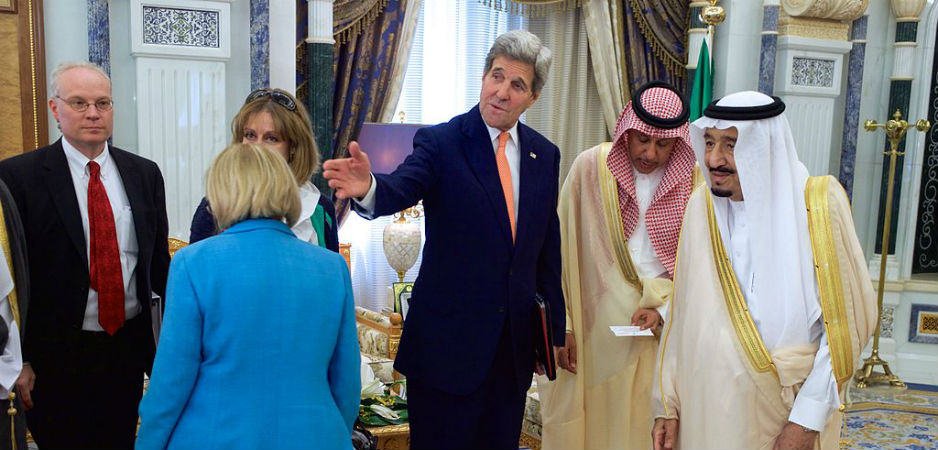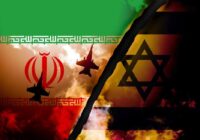With Saudi Arabia and Iran locked in a diplomatic row, concerted international intervention will be critical to avert a regional and global calamity, says former US Ambassador Gary Grappo.
Since the Arab Spring some five years ago, the Middle East has experienced a wave of tragic events. Many of them—Syria’s bloody civil war, Libya’s descent into chaos, the Islamic State’s diabolical barbarism, and Yemen’s senseless proxy war—have led to the loss of thousands of lives and created a massive refugee and displaced persons crisis. Others have sparked great instability and uncertainty, particularly Iraq and Egypt.
The good news in all of this mayhem may have been that at least the region’s governments had managed to avoid open conflict between one another.
That good news may have run its course. Two nations, Iran and Saudi Arabia—among the Middle East’s most powerful and well-armed—have now set themselves firmly on a collision course.
The events of the past week—Saudi Arabia’s execution of a well-known and highly regarded Shia cleric, Sheikh Nimr Bakr al-Nimr, Iranian torching of the Saudi Embassy in Tehran and consulate in Mershad, and the kingdom’s response in closing the Iranian Embassy in Riyadh and severing diplomatic ties—were only the last of many incidents that have set these two regional behemoths at odds.
Way stations already long-passed on this course include: the countries’ opposing policies on Syria; the proxy war in Yemen, in which Iranian support for the Houthi rebels triggered a Saudi-led intervention; conflicting views on the government of Abdul Fattah al-Sisi in Egypt; and the kingdom’s barely disguised opposition to the nuclear deal struck between Iran and the P5+1. Underlying all of this is the Saudi perception that the kingdom has lost its closest strategic ally of some 70 years: the United States.
Shia Islam and the Iranian Revolution
It is important to understand two issues that undergird the Saudi-Iranian conflict: Saudi distrust and even hatred of Shia Islam, and Iran’s revolutionary zeal. The two feed one another and fuel their dispute at every encounter.
Saudi antipathy toward Shia Islam and, therefore, toward Iran stems from its fundamentalist Wahhabi religious roots, despite the fact that some 15% of Saudis—most in the country’s Eastern Province—are Shia. Wahhabis typically view the Shia as rafida (rejecters) or even apostates, among those who have perverted Islam. In that sense, they may be worse than unbelievers. The aversion runs deep, from the very top of the kingdom’s leadership, through the religious establishment, which maintains an almost symbiotic relationship with the ruling al-Saud family, down to rank and file Saudis.
During my time in the Kingdom of Saudi Arabia (2003-2005), I experienced all manner of criticism and hatred for Shia at all levels. In many cases, the accusers had never actually met a Shia Muslim.
This antagonism has ebbed and flowed depending on the actions of Shia, both in the kingdom itself but in Iran in particular. After he established control of the Eastern Province, Ibn Saud, the founder of the modern Saudi state, eventually allowed the country’s Shia to expel Wahhabi preachers and quietly practice their faith. King Abdullah, the most recently deceased Saudi king and before that crown prince, sought ways to improve the conditions of Saudi Shia and better integrate them into Saudi life.
Major events, like the Iranian Revolution of 1979 and the election of fire-spewing Mahmoud Ahmadinejad to the Iranian presidency in 2005, reinforced Saudi fears and prejudices. Saudi Arabia’s antagonism has been further fired by Iran’s adventurism in Lebanon via its extremist Hezbollah Shia client; sponsorship of terrorist acts in the kingdom like the 1998 Khobar Towers attack that killed 19 American airmen; military and financial support for the Shia-aligned Alawite regime of Bashar al-Assad in Syria; active support for the growing Shia militia movements in Iraq; and most recent backing of Shia Houthi rebels in Yemen—at the kingdom’s backdoor, no less.
In fact, the Iranians, whether by intent or not, seem to have seized every opportunity to confirm to their Saudi rivals that Iran—and by extension Shia Islam—is indeed a threat to Saudi Arabia and all of Sunni Islam. To cite another example, the Iranian response to the Nimr execution—the invasion and destruction of the Saudi Embassy and Consulate—must have resurrected memories of the 1979 Iranian take-over of the American Embassy in Tehran and the 2011 attack on the British Embassy.
One may reasonably ask, despite “regrets” expressed by the Islamic Republic, is this how Iran deals with the actions of governments with which it disagrees?
The driving force behind Saudi Arabia’s recent actions, however, may have more to do with external events. The execution of Sheikh Nimr was not inevitable. While he was certainly involved in activities that might be characterized as mildly seditious, they hardly threatened the Saud family. In fact, the execution was a message that the Saudis will no longer tolerate any activity that suggests opposition to Riyadh or undermines the Wahhabi Sunni character of the kingdom. This is as important for Iran as it is for the US.
The most frightening aspect of such a clash is its palpable sectarian overtone. It would be seen by many Muslims as a kind of apocalyptic Sunni versus Shia donnybrook to purge Islam of its impurities and “rejecters.”
In the customs of the Bedouin Arabian Peninsula, where the Saud origins lie, the lines between allies and enemies are clearly drawn. There is no half-way; indeed, there are no non-aligned. The Americans have been a partner, if not ally, of the Saudis since the time of Ibn Saud. Today, however, the Saudis perceive the Americans backing away from that partnership on which the Saudis have relied for their “strategic” defense.
US-Saudi Relations
Recent actions by the Obama administration—for example, its abandonment of Egyptian President Hosni Mubarak in the wake of the Arab Spring and especially the nuclear accord with Iran—have convinced the Saudis that America is moving toward a more nuanced position in its relationships with the kingdom and with Iran. Nuance is not a characteristic of Bedouin political culture.
The Saudis are challenging America to choose. The Americans are unlikely to do so under President Barack Obama. And the Iranians are unable to break from their ideologically driven course—now reinforced by the successful conclusion of the nuclear accord and soon-to-be-lifted sanctions—to pursue ambitions likely to further antagonize the Saudi leadership. Both sides seem set, therefore, to collide.
The most frightening aspect of such a clash is its palpable sectarian overtone. It would be seen by many Muslims as a kind of apocalyptic Sunni versus Shia donnybrook to purge Islam of its impurities and “rejecters.” History shows that religious wars are most often the worst since the sides believe they are fighting in defense of God and his one, true faith. The battle would likely rage out of control as fringe extremist groups—think Islamic State, al-Qaeda and Hezbollah—joined the fray on multiple and often unpredictable fronts.
To avert such a crisis, America must find a way to reassure Saudi Arabia of its continuing partnership with the kingdom, even if on somewhat different terms than previously, and without stepping away from its commitments like the nuclear accord.
That and uber-active American diplomacy, with support from the European Union, Russia and other Arab states might possibly steer the bitter rivals away from open conflict toward diplomacy. That will require that all issues—Syria, Yemen and Saudi Arabia’s treatment of its Shia minority—be placed on the table for discussion. Moreover, both sides must be called to account for their support of sectarianism, Islamist extremism and violence, all of which are major contributing factors to this conflict and the Middle East’s instability and deteriorating state.
The views expressed in this article are the author’s own and do not necessarily reflect Fair Observer’s editorial policy.
Photo Credit: US Department of State
 We bring you perspectives from around the world. Help us to inform and educate. Your donation is tax-deductible. Join over 400 people to become a donor or you could choose to be a sponsor.
We bring you perspectives from around the world. Help us to inform and educate. Your donation is tax-deductible. Join over 400 people to become a donor or you could choose to be a sponsor.
Support Fair Observer
We rely on your support for our independence, diversity and quality.
For more than 10 years, Fair Observer has been free, fair and independent. No billionaire owns us, no advertisers control us. We are a reader-supported nonprofit. Unlike many other publications, we keep our content free for readers regardless of where they live or whether they can afford to pay. We have no paywalls and no ads.
In the post-truth era of fake news, echo chambers and filter bubbles, we publish a plurality of perspectives from around the world. Anyone can publish with us, but everyone goes through a rigorous editorial process. So, you get fact-checked, well-reasoned content instead of noise.
We publish 2,500+ voices from 90+ countries. We also conduct education and training programs
on subjects ranging from digital media and journalism to writing and critical thinking. This
doesn’t come cheap. Servers, editors, trainers and web developers cost
money.
Please consider supporting us on a regular basis as a recurring donor or a
sustaining member.
Will you support FO’s journalism?
We rely on your support for our independence, diversity and quality.






